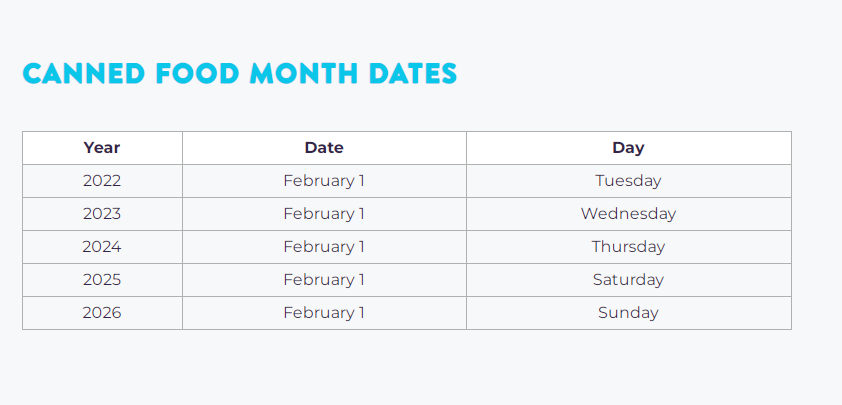
There’s plenty of myths surrounding canned goods, and so to help debunk them The Canned Food Information Council declared February to be National Canned Food Month. That’s right, a whole month dedicated to canned food, your kitchen life just got a whole lot easier. This modern form of food preservation began in the early 1800s and remains a popular way to donate extra food to those in need, save money in your own household, and keep cooking time down with pre-made favorites.
In the dark cold of February, when few fruits and vegetables grow, we’re so grateful for Canned Food Month. Before canning, the four main ways of food preservation were salting, drying, sugaring, and smoking – but Napoleon wanted to develop a better way. In response to a contest laid out by the French government in 1809, French inventor Nicholas Appert developed the first process that involved hermetically sealing and heat-sterilizing food storage containers. Rudimentary canning was born.
Appert wrote a book on his invention that inspired many and set the canning ball rolling. Soon thereafter, an English businessman adopted the invention idea and began to create a business based on tin-canned foods (as opposed to the glass cans that Appert used). The businessman was named Peter Durand, and in 1810 he patented the use of tin cans. By 1820, his crafty food-storage creation fed the Royal Navy in massive proportions.
Canneries began to experiment with specific different materials and methods for packaging their food. The cans were originally composed of tin-plated iron, but over time they were shifted to be steel with tinplate, and eventually aluminum. Aluminum is lighter and does not rust, and it’s commonly used today to package sodas and other beverages.
The 19th century saw a canning boom. Companies like Campbell Soup, Heinz, and Borden were selling off cans of food at lightning speed after the end of the economic depression in 1873. In 1903, Alexander Kerr invented the wide-mouth canning jar, for which he would later patent the famous lid – a metal disc and gasket held in place with a ring. Another name in the 19th-century canning industry was the Ball brothers, led by William Charles Ball. The brothers brought up many smaller canneries and led the industry after duplicating Kerr’s invention.
Today, canned foods are still incredibly popular and the technology that surrounds them is still being developed. Commercially canned goods are used by nearly all populations, and by all types of people – from private citizens to militaries to food banks. They’re a beloved (and cheap) dietary staple for many of us, and deserve all the hype they’ll receive this month!
Clean out those cabinets! It’s true canned foods last for quite a while, but if you haven’t eaten those beans in this long and they’re still good, it’s likely a family in need would make much better use of them. Drop off a box of canned goods at a local food bank or shelter, and enjoy the pantry space.
Think of this as your Top Chef moment: how can you turn canned carrots, beans, and pineapple into a gourmet meal? With over 1500 types of canned foods, you’re sure to make a hit dinner.
Want to stretch the monthly budget a little further? Don’t think you’re going to eat that vat of chili in one sitting? Save time and money by trying out your own canning process, and reap the rewards in the months to come.
Food cans are the most recycled packaging in the United States, proving that canned foods can be very environmentally friendly.
Though many people mistakenly believe that canned foods contain higher levels of sodium, they are not proven to be a top source of extra sodium - but you can still decrease the extra salt in the can by draining and rinsing the canned foods.
Did you know that fresh green beans cost more than 5 times the cost of canned green beans? Buying canned is a great way to stretch the monthly food budget.
Those 128,000 Americans who are yearly hospitalized with a foodborne illness must not have eaten canned foods, as the high-heat canning process canned foods go through effectively prevents the growth of dangerous microorganisms.
There are more than 1,500 different types of canned foods, so it’s never boring to eat from the can!
From being environmentally-friendly to being the best donatable item to families in need, canned foods have only a positive impact on the world. We love any safe food packaging that cuts down on plastic and can be recycled into another can when it’s used. Food banks always can use more canned food donations, and the cheap price of canned goods helps stretch the monthly budget of families in need.
Not many people can their own foods these days, and it’s a lost art. Anyone can go to the store and pick up a can of something, but canning it yourself, you realize the work that goes into making these goods safe, long-lasting, and delicious. Trying to can your own food is a fun adventure that makes you appreciate all the canned goods in your pantry!
Besides saving precious fridge space, canned goods make life in the kitchen so much easier. In many cases, canned goods come pre-chopped, pre-cooked, and pre-prepared. If you’re in a hurry to make dinner, or simply not feeling like slaving over a stove for a few hours, all you have to do is pop open a can.

Source from: National Day